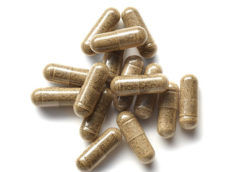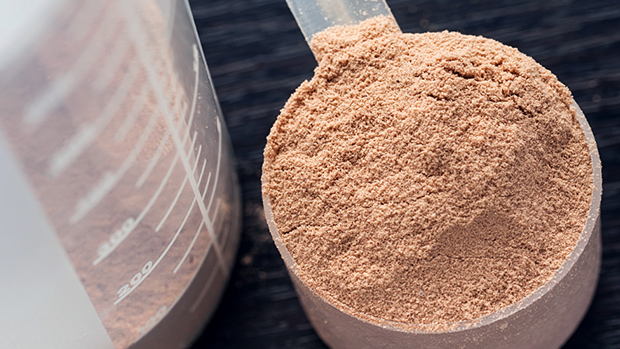Almost all diets work at first, but the lackluster results and neuroticism that come along later will make them more trouble than they're worth. Know when to follow the rules and when to break them. Here are three examples.
What It Is
Managing the amount of food you eat by counting calories or macronutrients (protein, fat, carbs).
Why It Sucks
Aiming for a quantitative intake of food has its place. I've used and defended it before. But doing it to prepare for a competition or to gain an overall awareness of your caloric and macronutrient intake is different than trying to adhere to a predetermined set of numbers long-term.
It's mentally exhausting. Is it healthy to go through life unable to eat without adding up the numeric value of everything you put in your mouth? After painstakingly following such diet plans, women have contacted me about this issue: a compulsive fear of eating without tracking their macronutrient ratio or caloric intake. This sounds a lot like OCD (obsessive compulsive disorder), which is a mental illness. Not something you should try to develop.
Food quality can become downplayed. If your meal consists of a chicken breast, 1.5 Oreos, 3.4 ounces of ice cream, and exactly fifteen green beans, then you might be starting to miss the big picture.
Your calorie requirements fluctuate daily. Your energy expenditure isn't fixed. The amount of calories you use and need isn't the same from day to day. And it's quite possible to lose fat consuming more total calories than a website's calorie calculator (or formula) says you need, even to maintain.
Plus having to stick to a predetermined number of calories on a day when you've trained harder than normal or have hormonal fluctuations just plain sucks. And losing fat doesn't have to mean going hungry. In fact, habitually undereating in order to maintain a caloric deficit won't exactly leave you with a fired-up metabolism.
And if you're a person whose workouts are constantly varied and intense, then you're kind of screwed. Some days you'll require more food, some days you'll require less, so hitting a number a calculator came up with will be unhelpful and burdensome, especially when it requires you to override your appetite.
Exercise aside, there are lots of variables impacting your energy expenditure and metabolism:
- The temperature of the room you're sitting in
- The amount of time you spend on your feet
- How much sex you have
- The spice content of your last meal
- The duration of a cold shower
- Recent marijuana use, which may have a thermogenic effect
- Alcohol use, which postpones your ability to burn fat
These are only a few variables impacting the amount of calories you burn and thus require from day to day. So do you think training yourself to eat only by numbers (instead of paying attention to your energy and appetite) is going to make you smarter about your body's actual needs?
Calorie counts aren't uniform. Even if you did expend the same energy every day, the numbers listed for the food you eat can be up to 20% inaccurate in either direction. No matter how careful you are, your counts may be under or over by up to 20%.
You can read every label, consult all the charts, and weigh every bite of food, and the 2000 calories you log might actually be 2400, 1600, or if you're lucky somewhere in between. Yet calorie and macro counters often get fanatical about hitting the "perfect" number.
A calorie is not a calorie. And a carb is not a carb. Let's pretend calorie calculators and labels really are accurate. Even so, the calories and macronutrients in different foods behave differently in the body. The body doesn't treat all calories the same, nor does it even treat the same macronutrients the same. This is true even if you're comparing carbs to carbs, proteins to proteins, or fats to fats. Resistant starch is a great example. It's a carb, but so is cane sugar. Yet they have a completely different impact on the body, especially when consumed regularly.
Likewise, fat coming from linoleic acid has a greater, more problematic, impact on your waistline and metabolism than other types of fat, even if calories are kept constant.
This is why it doesn't make sense to lump macronutrients together as if there's no difference. If you're counting macros and a great deal of your carbs come from foods containing resistant starch, you'll get a different result than you would if your carbs primarily came from sugary junk food. No, the results may not be visible at first, but your gut microbiota, energy, hormones, metabolism, and appetite will know the difference... and your long-term results will too.
Also, consider the thermic effect of food if you count calories but not macros. The human body must expend energy to digest food. Protein is the most expensive – it costs you more energy to break down than carbs or fat. Dietary fat is the least expensive. So are all calories equal? No. Are all the same macronutrients even equal? No.
Make It Not Suck
If you've never counted calories or tracked macros, do so. It'll show you how to compare foods and their estimated calories and nutrients. Those who've never tracked are often shocked to find they've been getting nowhere near enough protein.
But at some point you should be able to stop tracking and use what you've learned without the crutch of an app. Tracking your food intake for even as little as a few weeks should give you a pretty solid awareness of the foods you eat most often. You should also have a ballpark idea of how much you need in order to feel good depending on your training, recovery needs, time of month, appetite, etc.
If you're doing it to lose fat, then overriding hunger in order to fill a quota will work the opposite of how you want it to. Do it long enough and you'll stop knowing how to eat without an app. No diet should make you that dumb about your own body.
And remember, when it comes to training hard, expending maximal amounts of energy requires energy. So being excessively anal about your a caloric deficit can be counterproductive.
If you believe you'll gain weight without tracking your food, then maybe you need to get to the bottom of certain issues that cause you to eat when you're not hungry. Or maybe you need to start looking at food quality and eating meals that are more satiating with fewer calories. If you can't control yourself or eat sensibly using your appetite as a guide, then you may have other issues.
You can get leaner and maintain it without pulling out your phone before every meal, but doing so requires improving your food preferences and trusting your appetite. If you're counting macros and measuring ounces of ice cream in order to maintain a perfectly average looking body, realize that you can get the same results without the neuroticism required to track every morsel you put into your mouth.

What It Is
A diet that emphasizes "natural" and unprocessed foods and contains fewer prepackaged products and refined sugar.
Why It Sucks
It too can lead to obsessive thinking, and if you're cutting out one food after the next without really knowing why, you're bound to end up failing. Plus the oversimplified rhetoric of "only eat what's natural" is nonsense.
Many processed foods are packed with nutrition and can help dieters reach their goals, while many "natural" foods can sabotage fat loss efforts when they're overemphasized. Quality lean deli meat for instance is high in protein and makes an excellent sandwich filling, but it's processed. Fish oil is another biggie. You'd have to eat several pounds of oily fish in order to get the benefits of just a few "processed" capsules. Protein powder and workout supplements are another example of processed items that can increase muscle growth, fat loss, performance, and recovery.
There's also the "if you can't pronounce it" BS which states that if you can't say an ingredient then you shouldn't eat it. Or this one: if your grandma wouldn't recognize it, you shouldn't eat it. But beneficial foods often have funky names, and your literacy shouldn't impede your nutrition. If your grandma lived through the depression, she probably didn't research advanced nutrition; she just ate what was available.
We have the opportunity to not only choose from what's available, but to manipulate it for our specific goals. Example: citrulline malate, which protects muscles from fatiguing and helps them recover faster from intense exercise. If you won't use it because your grandma doesn't recognize it, then you probably ought to get on board with the developments of this century.
Nuts, on the other hand, are one of those unprocessed foods that clean eaters love to eat, and often overeat. And while they're perfectly healthy in appropriate amounts they're not helping your body composition when taken to excess. Same with all the organic, hippiefied sweeteners, grass-fed butter, juices, dried fruits, granolas, etc.
Make It Not Suck
Appreciating food quality is great, but having zero consideration of the calories and macronutrients your food contains is a surefire way to sabotage yourself. If you're eating upwards of 5,000 "unprocessed" calories a day, then figure out a smarter way of satisfying your appetite.
Track your food for a while to gain a general awareness of your overall calorie consumption and an appreciation of macronutrients. This doesn't mean becoming more obsessive. It means taking a tip from macro counters and eating for your objectives.
If choosing nutrient-dense food comes easy to you, then you're already ahead. Now start getting more strategic about which ones will benefit your performance and body comp, and which ones become a disappointing calorie bomb after just a few bites.

What It Is
It's kind of like clean eating, but without anything that comes from agriculture. No rice, oats, or other grains. It has varying degrees of stringency ranging from no dairy or legumes, to a more relaxed approach that only prohibits processed foods and grains.
Why It Sucks
It mainly sucks if you're a lifter who's consistent in the gym, and often uses high intensity exercise. Staunch paleo dieters even have a term for people like us: "chronic exercisers." As if consistent workouts are a disease. (Are people who love books, chronic readers?) You can make any behavior sound bad when you describe it as chronic.
But this labeling just means that their diet falls short for people who want conspicuous muscle and a high performance body. In fact, those who train hard and follow a paleo diet often can't recover fast enough to work out consistently. Nor can they satiate their appetite for fast-digesting, high-carb foods using a paleo approach. So you'll find many of them having "cheat days" packed with non-paleo junk food, which keeps them stuck in a cycle of hard-core-paleo days followed by crap-food-binge days.
The second reason it can suck is because just like "clean eating" there are paleo-approved foods that are high in calories and easy to overeat – bacon, nuts, butter, dried fruit, and coconut oil are a few. And when eaten with abandon, they'll make fat loss impossible.
Make It Not Suck
The thing about people who lift is that we occasionally need insulin to rise to meet our performance needs. And coconut kale smoothies don't do the trick. But since insulin is portrayed as "the hormone that makes you fat," dieters will try to avoid it at all costs while sporting their paleo-approved man boobs.
If you're a "chronic exerciser"...
- First, make peace with select processed foods and supplements that serve your purposes (improved performance, satiety, anabolism, and energy). Keep in mind, the foods that satiate your appetite will be a lot different than the foods that satiate the appetite of the average American who doesn't work out as hard or as often as you.
- Then try swapping some of your high fat foods for starchier carbs. Beans, oats, rice, and potatoes are examples of filling and nutritionally dense foods, and the lectins actually won't kill you. If you're worried that they'll bind to the vitamins and minerals in your diet and keep you from absorbing nutrients, then relax, you're probably eating more than enough nutrients. So whatever binding that takes place won't be enough to make you vitamin and mineral deficient. Having enough carbs to fill up your glycogen stores and fuel your performance will probably ameliorate your desire to cheat every weekend.
- Become aware of the serving sizes of the things that are the most calorically dense. Hint: They're usually very high in fat, like coconut oil, bacon, butter, nuts, heavy cream, etc. – these are the things that'll sabotage your fat loss efforts if you're overconsuming them. And trust me, when you're craving carbs and you're overriding that appetite, you'll be tempted to overeat the high fat, calorie bombs.
How about a diet based on common sense? In a perfect world you'd eat the right amount of delicious yet beneficial (or at least benign) foods using your appetite to determine when to eat and how much. You'd enjoy your meals and you'd be as lean, fit, and athletic as you'd want to be.
Problem is, our food preferences and habits have gotten out of whack. So for most people, it's hard to use common sense. The hyperpalatability of the standard American diet has set us up for some pretty crappy eating behaviors. And dieting has become the antidote.
There's nothing inherently wrong with that. Diet comes from the Greek word, diata, which just means "daily" or way of life. So testing out a different way of life to improve your appetite and health is a good thing – if you learn from it. A diet should make you a more savvy eater; if it doesn't then you're doing it wrong because you're learning nothing.
They say you have to learn the rules to know how to break them. So when you diet and stop seeing results, start thinking about which parts of it you can keep and which parts you can toss. Don't be anti-diet, but don't become a diet zealot either. Keep your wits. If you're going to do any of them, follow the rules at first. Give it a fair shot. Read a damn book on how to do it right.
There are people who go on diets they've crafted via headlines and hearsay. They're the ones who make a half-assed effort to follow the rules without knowing why. Then when they fail, they proclaim, "Dieting doesn't work!" Don't be that guy or gal.
Most importantly, micromanaging your food intake is a terrible Band Aid for deeper issues like emotional eating. And if you're an emotional eater, don't even diet. Instead keep a food journal to increase awareness of what you eat, why, and when. Address that first.
There's value to be found in nearly every diet (except a few like the HCG diet or anything a celeb does). So take what you learn and make it work for the long haul.




